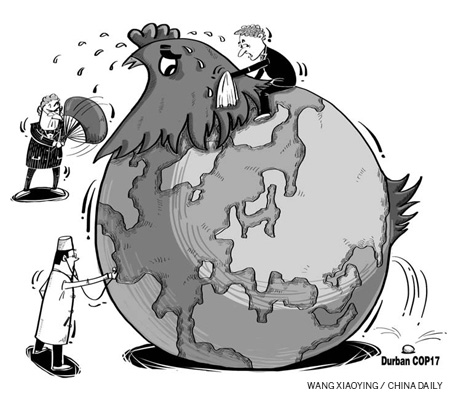
This week, the United Nations Climate Change Conference in Durban brings together representatives of the world's governments, international organizations and civil society in a final bid to advance the implementation of the United Nations Framework Convention on Climate Change, and its Kyoto Protocol, before the Kyoto Protocol expires on Dec 31, 2012.
Change is needed urgently. The world cannot afford to delay further action to tackle climate change if the target of limiting the global average temperature increase to 2 degrees Celsius is to be achieved. This is the temperature ceiling that scientists say would give the world a reasonable chance of avoiding the worst impacts of climate change. A new report by the United Nations Environment Program confirms that current emissions reduction pledges made by governments are inadequate to achieve this target. And emissions have risen, once again, in the past year, making it one of the warmest in recorded history.
It is vital that we continue to strive for a binding international agreement, and to increase our level of ambition with respect to emission reduction targets. At the same time we must also tackle, in an integrated way, the social dimensions of the issue: poverty, population growth, resource management and risk reduction, to name a few. The world must learn to grow and develop not only in a greener, more climate friendly way, but also more inclusively.
There is much that the international community can and must - do to support developing countries in this endeavor. We can help support the right policies and institutional frameworks. We can share lessons on how climate friendly development can promote job creation and on how to ease adjustments associated with adopting greener economic models. We can improve market access so that developing countries can take advantage of green market opportunities. We can promote universal access to modern, clean and affordable energy services for all, especially for the poor.
Perhaps most crucially, we can do more to mobilize and expand financing options so poor countries can fund their mitigation and adaptation plans, as well as attract private and public investment in low-carbon development.
Transforming development pathways toward green and inclusive growth is challenging. But it is doable if governments, the private sector and civil society put their mind to it. Indeed, it is only with the full involvement of the private sector and civil society that such transitions can be fully made.
China has taken many important steps to chart this new path. It has integrated climate change into its national development plan, established significant targets and policies to reduce fossil fuel consumption and promote low-carbon energy sources, and is working concertedly to restructure its economy to make it more climate friendly and resilient. It has fixed a target to reduce carbon intensity by 40 to 45 percent by 2020 compared to the 2005 level. And just this November, China approved the piloting of a greenhouse gas emission rights trading scheme in seven provincial regions, covering more than 200 million people. The potential expansion of these pilot schemes into a nation wide trading system from as early as 2015 would be very significant.
China has also set rigorous energy efficiency targets for itself. It is now the world leader in renewable energy investment: in 2010 it invested $48.9 billion in green energy and technology research. And it is the world's largest manufacturer of wind turbines and solar panels. There is growing demand for more of these green energy solutions globally, and they will create more jobs for China in the future. Low-carbon innovation has the potential to become a key driver of China's continued development and transformation.
At the same time as it advances its own development, China has a tremendous opportunity to contribute to the global public good: not only through reducing its greenhouse gas emissions, but by sharing the knowledge and expertise it acquires with other developing countries. International cooperation and knowledge exchange will be particularly important in helping poor countries improve their capability to mitigate and adapt to climate change. Indeed, China has already begun this kind of sharing.
In this regard, the United Nations system welcomes China's commitment, highlighted in its recent White Paper on Climate Change, to further strengthen international exchanges, resource sharing and practical cooperation with international organizations, and developed and developing countries.
The United Nations system is committed to continuing its assistance to China in its efforts to create a green and inclusive growth pathway and to enhance South-South sharing of lessons and experience. During more than 30 years of partnership with China, we have worked together to advance many development priorities. Now, with climate change an ever more pressing challenge, the UN system is partnering with China across a range of climate issues: renewable energy and energy efficiency, market transformation, adaptation, the development of provincial climate change plans, and most recently, emissions trading. But there is still much work to be done.
We hope that China's growing efforts to tackle climate change mitigation and adaptation will inspire other countries that are meeting in Durban to spare no effort to contain global warming. The Durban COP17 is not coming at an easy time for many, indeed most, countries. But scientists tell us it is now or never. And, as the great Chinese philosopher Laozi said: "If you do not change direction, you may end up where you are heading."
The author is UN resident coordinator and UNDP resident representative in China.
(China Daily 12/02/2011 page9)